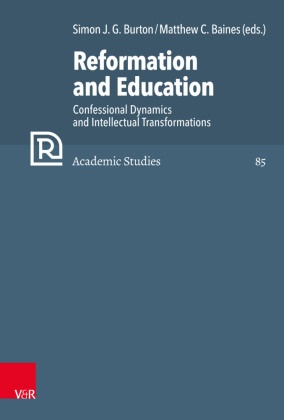
Reformation and Education - Confessional Dynamics and Intellectual Transformations
| Verlag | Vandenhoeck & Ruprecht |
| Auflage | 2022 |
| Seiten | 292 |
| Format | 16,0 x 23,5 x 2,5 cm |
| Gewicht | 699 g |
| Artikeltyp | Englisches Buch |
| Reihe | Refo500 Academic Studies (R5AS) Band 085 |
| ISBN-10 | 3525560559 |
| EAN | 9783525560556 |
| Bestell-Nr | 52556055A |
This volume explores the dynamic interplay between reform movements and pedagogical advances in the sixteenth and seventeenth centuries across an illustrative sample of key figures, confessional allegiances, and locations.
Reconfiguring the relationship between Reformation and education in early modernity.
Closely entwined with the educational revolution of early modernity, the Reformation transformed the pedagogical landscape and culture of the sixteenth and seventeenth centuries. Embracing a broad understanding of the Reformation this volume examines the confessional dynamics which shaped the educational transformations of early modernity, including Calvinists, Lutherans, Anabaptists and Roman Catholics in its scope. Going beyond conventional emphases on the role of the printing press and theological education of clergy in university settings, it also explores the education of laity in academies, schools and the home in all manner of topics including theology, history, natural philosophy and ethics. More well-known figures like John Calvin and Philipp Melanchthon are examined alongside less-well known but important figures like Caspar Coolhaes and Lukas Osiander. Likewise, more prominent centres of reform including Switzerland, Germany and the Netherlands are considered together w ith often overlooked locations like the Czech Republic and Denmark.
Reconfiguring the relationship between Reformation and education in early modernity.
Closely entwined with the educational revolution of early modernity, the Reformation transformed the pedagogical landscape and culture of the sixteenth and seventeenth centuries. Embracing a broad understanding of the Reformation this volume examines the confessional dynamics which shaped the educational transformations of early modernity, including Calvinists, Lutherans, Anabaptists and Roman Catholics in its scope. Going beyond conventional emphases on the role of the printing press and theological education of clergy in university settings, it also explores the education of laity in academies, schools and the home in all manner of topics including theology, history, natural philosophy and ethics. More well-known figures like John Calvin and Philipp Melanchthon are examined alongside less-well known but important figures like Caspar Coolhaes and Lukas Osiander. Likewise, more prominent centres of reform including Switzerland, Germany and the Netherlands are considered together w ith often overlooked locations like the Czech Republic and Denmark.
